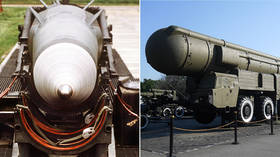Operation Kashmir: Has Modi checkmated Pakistan?

The decades-old disputed region has entered an intriguing new phase where India is pushing the envelope, Pakistan is staring at a dead end, and the US is flirting with intervention.
Indian Prime Minister Narendra Modi is famed for taking the bull by the horns. He keeps his cards close to his chest and then unveils strategic surprises which fundamentally transform the issue at hand.
His radical restructuring of the troubled state of Jammu & Kashmir by revoking its seven decade-long separate autonomous status and converting it into a centrally administered territory is a landmark decision which will change the nature and contours of politics not only in Kashmir but across South Asia.
Also on rt.com India moves to revoke Kashmir autonomy amid spike of tensions around disputed regionGhetto to mainstream
Internally, Modi’s bold re-designation of Kashmir as a union territory with a legislature is a dream fulfilled for Indian nationalistic sentiment which never accepted the compromise provisions in the Indian Constitution under Articles 370 and 35A, wherein Muslim-majority Kashmir had been allowed a parallel Constitution with a flag of its own. State governments in Kashmir had powers over law enforcement, residence and property rights. Central laws had no validity in Kashmir unless the local legislature approved them.
In effect, the autonomous status turned Kashmir into a ghetto with a mentality of uniqueness and distinctness from the rest of India. It strengthened the nearly seven million Kashmiri Muslims’ feeling that they are not Indians but a different nationality who deserve to keep Indians out of their paradisiacal enclave except as visiting tourists.
The armed secessionist movements in Kashmir against Indian rule from the late 1980s occurred in the context of this autonomous status, with local elite Kashmiri Muslim politicians of various hues hanging on to their privileges with the narrative that Kashmir is not really a part of India but an independent nation which, if pushed to extremes, will break away from India and declare itself as a new country or merge into Pakistan.
Indian leaders before Modi stuck to the tacit bargain whereby Kashmir retained its special status and, in return, willy-nilly stayed within the territorial boundaries of India. The autonomy provisions in the Indian Constitution, enacted in the 1940s and 1950s, were meant to be a temporary fix to buy the loyalty of Kashmiri Muslims, but they were extended indefinitely.
Also on rt.com Pakistani army ready go to ‘any extent’ to support Kashmiris – chief of staffOver time, the halfway house existence of Kashmir as a state within India and yet a nation that does not emotionally belong to India failed to meet both India’s objectives and Kashmiri Muslims’ aspirations. Waves of anti-India uprisings and insurgencies, supported from across the border by Pakistan, kept Kashmir burning. Autonomy had become a slippery slope for separatism, jihadist extremism and alienation of Kashmiri Muslims from the rest of India.
Modi’s bet is that by corralling Kashmir under tighter central government control, he will marginalise the secessionist politicians there, open Kashmir up for the return of Hindu Kashmiri minorities who had been ethnically cleansed by jihadists in the late 1980s, and alter the demographic mix in Kashmir through settlement of Indians of all religious and ethnic backgrounds.
Since autonomy backfired, Modi is saying ‘enough with appeasement’ and aiming for assimilation and complete integration of Kashmir. Demographically, the idea is to dissolve Kashmiri separatism in a sea of Indian nationalism through the intermixing of populations, blunting the sharp edge of separatism that comes from lack of ethnic heterogeneity in the Kashmir Valley, where 97 percent of the population is Muslim.
Modi’s decision has evoked opposition from some Indian political parties wedded to the old arrangement of special autonomy for Kashmir because they fear that assimilation will deprive them of vote banks of Kashmiri Muslims and enfeeble Kashmiri elites whose parties can be alliance partners during and after elections.
Cancelling autonomy for Kashmir also risks escalating civil unrest in Kashmir, where anti-India elements like the Hurriyat Conference fear falling under tremendous pressure if Kashmir is centrally governed. But the only opinion that matters to Modi is the will of the general public across India, which has overwhelmingly and emotionally welcomed his overturning of Kashmir policy as necessary from the lens of national unity.
Also on rt.com Better call Trump? Pakistan's options limited after India strips autonomy of disputed KashmirAction and reaction
Whether this momentous shift will pay off as Indian nationalists expect depends not only on how Kashmiri Muslim elite politicians adjust to the new administrative reality Modi has created, but also on Pakistan. Modi’s slam dunk move is intended to yank the initiative away from Pakistan, which claims Muslim-majority Kashmir as its rightful territory, and usher in a new era of Indian consolidation over the contested Himalayan region.
Pakistan, which has controlled one-third of Kashmir since the first India-Pakistan war of 1947-1948, has long relied on stoking Kashmiri Muslim alienation in the two-thirds of Kashmir held by India. Freeing Kashmir from India’s clutches is a Holy Grail of the Pakistani military, which has funded, trained and armed thousands of Kashmiri Muslims as well as jihadists from Pakistani ethnic groups like Punjabis and Pashtuns who slipped back and forth across the mountainous militarised border dividing Indian Kashmir from Pakistani Kashmir.
Modi’s determined push for total absorption of Indian Kashmir into India proper presents an existential challenge to the long-entrenched Pakistani strategy of fanning alienation of Kashmiri Muslims against India. If Kashmiri Muslims are reorganised and no longer grouped together as an exclusive ethnic entity, Pakistan will find it a lot harder to foment the flame of self-determination.
Modi is redefining the very meaning and identity of ‘self’ in Kashmir, a process that will take years and decades, but whose endpoint will be dilution of pro-independence and pro-Pakistan affiliations in the reshuffled Kashmiri society of the future. Kashmiri Muslims may become further alienated from India as a result of this makeover, but Modi is calculating that, in years to come, they will no longer be numerically so dominant as to stymie Indian sovereignty.
With the writing on the wall, Pakistan will look for drastic and urgent action in the near term to foil Modi’s long-term blueprint. Islamabad’s threat to “exercise all possible options to counter the illegal steps” Modi has taken by scrapping Articles 370 and 35a underscores the existential crisis perceived by the Pakistani state apparatus. Its ‘options’ include internationalisation of Kashmir as a dangerous flashpoint or hotspot that could explode in war and nuclear holocaust, and to knock on the doors of the UN and the Muslim world by appealing to alleged human rights violations in Indian Kashmir.
Also on rt.com Pakistan will use ‘all possible options’ to counter revocation of Kashmir autonomy by India – FMTrump in the middle
Pakistani Prime Minister Imran Khan recently extracted a rhetorical giveaway from US President Donald Trump that he would “love to be a mediator” in the Kashmir dispute as an apparent quid pro quo for Pakistan’s support to extricate the US military from Afghanistan.
Modi’s ‘Operation Kashmir’ to thoroughly unify the region with India, which was meticulously planned and is being executed in sequential phases, may have been fast-forwarded as a pre-emptive manoeuvre in light of Trump’s opportunistic comments on Kashmir. Khan’s tweet that “this is the time” for Trump to intervene and prevent Kashmir from blowing up into “a regional crisis” indicates that Islamabad will try hard to inveigle Washington into the frame.
A surge in military clashes with India along the 740-kilometre-long Line of Control (LOC) and attempted terrorist attacks inside Indian territory to provoke a harsh counter-reaction from Modi, which in turn will force Trump to meddle, is an ideal scenario for Pakistani hawks.
Historically, the ebbs and flows of jihadist terrorism in Kashmir and India-Pakistan relations have been interlinked with the interests of great powers from outside the region and the situation in Afghanistan. Modi has dispatched diplomats to convince major powers around the world and ensure that the fallout of his ‘Operation Kashmir’ does not become unmanageable. If Pakistan’s plan is to raise alarms about instability and human rights before the international community, India’s talking points are about the dire threat posed by Islamist terrorism and legitimate security needs of sovereign states.
It is a game of rapid chess where one has to quickly anticipate what the other side is likely to do, two or three moves down the line, and accordingly shuffle the pieces. Modi has opened with a historic gambit, but many unknowns lie in store. To cite the mercurial Trump’s favourite punchline, “we’ll see what happens.”
Like this story? Share it with a friend!
The statements, views and opinions expressed in this column are solely those of the author and do not necessarily represent those of RT.















